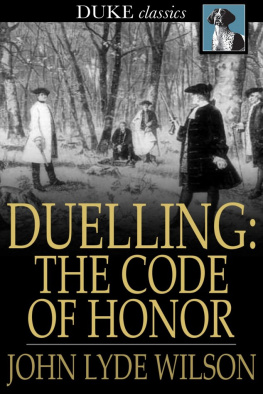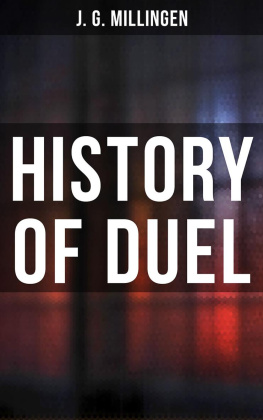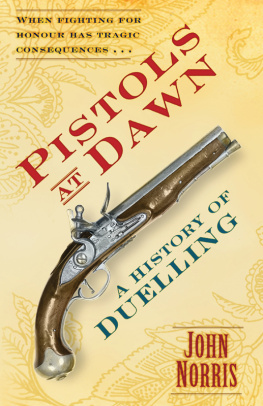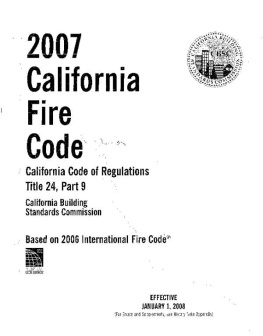DUELLING: THE CODE OF HONOR
OR, RULES FOR THE GOVERNMENT OF PRINCIPALS AND SECONDS IN DUELLING
* * *
JOHN LYDE WILSON
*
Duelling: The Code of Honor
Or, Rules for the Government of Principals and Seconds in Duelling
From an 1858 edition
ISBN 978-1-62011-420-9
Duke Classics
2012 Duke Classics and its licensors. All rights reserved.
While every effort has been used to ensure the accuracy and reliability of the information contained in this edition, Duke Classics does not assume liability or responsibility for any errors or omissions in this book. Duke Classics does not accept responsibility for loss suffered as a result of reliance upon the accuracy or currency of information contained in this book.
Contents
*
Preface
*
Originally this was published by the author (1784-1849), aformer governor of South Carolina, as a 22-page booklet, in 1838.Before his death he added an appendix of the 1777 Irish duelling code,but this second edition was not printed until 1858, as a 46-page smallbook, still sized to fit in the case with one's duelling pistols. Thiscode is far less blood-thirsty than many might suppose, but built on aclosed social caste and standards of behavior quite alien to today.
To the Public
*
The man who adds in any way to the sum of human happiness is strictlyin the discharge of a moral duty. When Howard visited the victims ofcrime and licentiousness, to reform their habits and ameliorate theircondition, the question was never asked whether he had been guilty oflike excesses or not? The only question the philanthropist wouldpropound, should be, has the deed been done in the true spirit ofChristian benevolence? Those who know me, can well attest the motivewhich has caused the publication of the following sheets, to whichthey for a long time urged me in vain. Those who do not know me, haveno right to impute a wrong motive; and if they do, I had rather be theobject, than the authors of condemnation. To publish a CODE OF HONOR,to govern in cases of individual combat, might seem to imply, that thepublisher was an advocate of duelling, and wished to introduce it asthe proper mode of deciding all personal difficulties andmisunderstandings. Such implication would do me great injustice. Butif the question be directly put to me, whether there are not caseswhere duels are right and proper, I would unhesitatingly answer, thereare. If an oppressed nation has a right to appeal to arms in defenceof its liberty and the happiness of its people, there can be noargument used in support of such appeal, which will not apply withequal force to individuals. How many cases are there, that might beenumerated, where there is no tribunal to do justice to an oppressedand deeply wronged individual? If he be subjected to a tame submissionto insult and disgrace, where no power can shield him from itseffects, then indeed it would seem, that the first law of nature,self-preservation, points out the only remedy for his wrongs. Thehistory of all animated nature exhibits a determined resistance toencroachments upon natural rights,nay, I might add, inanimatenature, for it also exhibits a continual warfare for supremacy. Plantsof the same kind, as well as trees, do not stop their vigorous growthbecause they overshadow their kind; but, on the contrary, flourishwith greater vigor as the more weak and delicate decline and die.Those of different species are at perpetual warfare. The sweetest rosetree will sicken and waste on the near approach of the noxiousbramble, and the most promising fields of wheat yield a miserableharvest if choked up with tares and thistles. The elements themselveswar together, and the angels of heaven have met in fierce encounter.The principle of self-preservation is co-extensive with creation; andwhen by education we make character and moral worth a part ofourselves, we guard these possessions with more watchful zeal thanlife itself, and would go farther for their protection. When one findshimself avoided in society, his friends shunning his approach, hissubstance wasting, his wife and children in want around him, andtraces all his misfortunes and misery to the slanderous tongue of thecalumniator, who, by secret whisper or artful innuendo, has sapped andundermined his reputation, he must be more or less than man to submitin silence.
The indiscriminate and frequent appeal to arms, to settle trivialdisputes and misunderstandings, cannot be too severely censured anddeprecated. I am no advocate of such duelling. But in cases where thelaws of the country give no redress for injuries received, wherepublic opinion not only authorizes, but enjoins resistance, it isneedless and a waste of time to denounce the practice. It will bepersisted in as long as a manly independence, and a lofty personalpride in all that dignifies and ennobles the human character, shallcontinue to exist. If a man be smote on one cheek in public, and heturns the other, which is also smitten, and he offers no resistance,but blesses him that so despitefully used him, I am aware that he isin the exercise of great Christian forbearance, highly recommended andenjoined by many very good men, but utterly repugnant to thosefeelings which nature and education have implanted in the humancharacter. If it was possible to enact laws so severe and impossibleto be evaded, as to enforce such rule of behavior, all that ishonorable in the community would quit the country and inhabit thewilderness with the Indians. If such a course of conduct was infusedby education into the minds of our youth, and it became praiseworthyand honorable to a man to submit to insult and indignity, then indeedthe forbearance might be borne without disgrace. Those, therefore, whocondemn all who do not denounce duelling in every case, shouldestablish schools where a passive submission to force would be theexercise of a commendable virtue. I have not the least doubt, that ifI had been educated in such a school, and lived in such a society, Iwould have proved a very good member of it. But I much doubt, if aseminary of learning was established, where this Christian forbearancewas inculcated and enforced, whether there would be many scholars.
I would not wish to be understood to say, that I do not desire to seeduelling to cease to exist entirely, in society. But my plan for doingit away, is essentially different from the one which teaches a passiveforbearance to insult and indignity. I would inculcate in the risinggeneration a spirit of lofty independence; I would have them taughtthat nothing was more derogatory to the honor of a gentleman, than towound the feelings of any one, however humble. That if wrong be doneto another, it was more an act of heroism and bravery to repair theinjury, than to persist in error, and enter into mortal combat withthe injured party. This would be an aggravation of that which wasalready odious, and would put him without the pale of all decentsociety and honorable men. I would strongly inculcate the propriety ofbeing tender of the feelings, as well as the failings, of those aroundhim. I would teach immutable integrity, and uniform urbanity ofmanners. Scrupulously to guard individual honor, by a high personalself respect, and the practice of every commendable virtue. Once letsuch a system of education be universal, and we should seldom hear, ifever, of any more duelling.
The severest penal enactments cannot restrain the practice ofduelling, and their extreme severity in this State, the moreeffectually shields the offenders. The teaching and preaching of oureloquent Clergy, may do some service, but is wholly inadequate tosuppress it. Under these circumstances, the following rules are givento the public, and if I can save the life of one useful member ofsociety, I will be compensated. I have restored to the bosoms of many,their sons, by my timely interference, who are ignorant of the miseryI have averted from them. I believe that nine duels out of ten, if notninety-nine out of a hundred, originate in the want of experience inthe seconds. A book of authority, to which they can refer in matterswhere they are uninformed, will therefore be a desideratum. How farthis code will be that book, the public will decide.








